Share Your Story With The World! Special Offer Ends In:
“The #1 Tool Successful
Storytellers Use To Sell
Their Film & TV Rights"
Data Reveals: 9x More Deals Get Done Using This Obvious Method

Why did you start writing stories?
Since the dawn of time, humans have used stories to communicate and connect with one another...
If you’re like most storytellers, you want to inspire and touch people with your words, and share a unique story with the world.
You have the ability to motivate and inspire large numbers.
Now if you’ve ever been told “Wow! Your story would make a wonderful movie or show!”, then you’re in an amazing position to affect and even wider audience by tapping into one of the most widespread and far-reaching methods people use to consume content…
Film & Television.
But you may have noticed something…
It’s really hard to get your story noticed by people in Hollywood. And even harder to get your story real and in-depth consideration.
If you’re like me when I first started, you’ve tried everything under the sun to get your project through the gatekeepers.
Perhaps you’re an author of a book or manuscript and you’ve sent out 100s of unanswered query letters.
Or maybe you’ve even written a screenplay and tried calling production companies…
And likely had dozens of people stop you dead in your tracks, hang up on you, or you’ve heard the proverbial, “We don’t take unsolicited submissions”.
Maybe you’ve even had producers take a look at your story already, but no one has pulled the trigger, said yes, or offered you a deal. Most of the time, they don't even get back to you with any feedback.
Or, maybe instead, you've been 'waiting to be discovered', and hoping producers and executives would be calling you.
In any event, it’s tiring, demoralizing, and you’re spent.
But if you’re like I was, then you’re super passionate about your story and believe wholeheartedly in its potential on screen.
And you won't let challenges and obstacles stand in your way.
Well, I’m going to let you in on some insights that can change the game for you…

The Most Valuable Game-Piece
Successful Book Authors Use
To Get Their Movie or TV Show Made
*Screenwriters, you will find this interesting so keep reading. And there are also some key pieces of advice just for you below!
So here you are, an author with a potentially life-changing story and no one in Hollywood will listen to you.
Or you've been told that 'your story needs work' before someone will buy it.
But you don’t have the know-how or relationships to make your dream of watching your movie or show on screen a reality.
Maybe you’ve even given up, shelved your book, and set aside those aspirations.
Yet every time you watch another Netflix show you wonder to yourself, “My story is just as good as this (or better); why isn’t it mine on screen?!”
Or, when you’re watching the Oscars, those little fantasies creep in that you barely admit to yourself - and you see yourself on to the stage accepting your Academy Award. Who would you thank? (Don’t be shy; we all have that fantasy).
But what do you do when it’s next to impossible to get anyone in Hollywood to read your book?
Hint: They won't read your book!
Well, at least not at first.
You see, it’s a BIG request for a busy executive to read your book. It's a huge chunk of their time.
When an executive is wondering what to take home at night to read, they prioritize based on one of 3 things:
1) Is it a NY Times Bestseller?
2) Did it come highly recommended from someone I know and trust?
3) Is it going to be easy and quick to read?
Chances are, you don’t hit any of those! Becoming a NY Times bestseller is really hard. So is getting a power agent to represent you!
BUT it is certainly in your grasp to make your material quick and easy to read!
So imagine that same busy executive deciding what to take home that night… he or she has a book in one hand, and a screenplay in the other.
Which is the producer going to take home?
Let’s see… it will take him or her 20+ hours to labor through your book. But only an hour or two to get through the screenplay.
Humans are lazy. Executives are no exception.
So which is the busy executive going to take home?
You know the answer.

What my Uncle Taught Me About
Screenplays And Why They Make Doing
A Deal In Hollywood 9x Easier
Let me tell you a story:
My uncle David is a real estate developer. He buys and sells ranches (and he’s really good at it). Now he’s worked really hard to get where he is and he kind of likes to rest on his laurels now and only pursue the easy deals (hint: he’s like every buyer in Hollywood).
I’ll never forget the lesson he taught me when I was up visiting him at his ranch in Montana.
One day a young guy came up to my uncle’s place with a deal involving a piece of land he’d found. But the guy didn’t have any money, so he came to my uncle and asked him if he wanted to go in on the deal.
Now my uncle is a nice guy and he loves people so he sat down with him, looked over the deal and surmised that it would simply be too much work for him to get the property purchased and developed for sale (remember, he doesn’t like to work that hard anymore).
So he wished the guy well and sent him on his way.
Interestingly enough, the very next day, another guy came by and, I kid you not, he had found a piece of land that literally sat adjacent to the land that the previous guy had found.
For all practical purposes it was identical –similar size, water access, everything.
Yet my uncle did the deal with him on the spot! Right then and there, with a Montana handshake!
So what was the difference?!
Guy #1 had come with land. Guy #2 had also come with land…
But why did my uncle do a deal with guy #2?
You see, guy #2 had put in the time-consuming work of having it permitted for a subdivision, had plans drawn up, had it surveyed for environmental issues, etc.
He’d done enough of the work that my uncle could envision the project and make sense of it QUICKLY. And that work he’d done would end up saving my uncle time and money and free him up to focus on what he does best – bring capital to the deal to get the project under way.
Think of it this way…
In Hollywood, your book is raw land…
But a screenplay is the roads, plans, and permitting.
The screenplay is the blueprint for the movie or show!
Reading a script helps the producer envision exactly how your book will look onscreen without him or her having to do a lot of work (in their head). It’s like paint by numbers!
And this is why you’re literally 9 times more likely to sell your film/TV rights if you have a screenplay based on your book already in hand!
We’ve tracked the data for over four years on many of the self-published book deals in Hollywood and projects that have screenplays are 900% more likely to sell than projects that don’t.
Those are huge numbers that demonstrate a huge edge.
But saving time and saving energy aren’t the only things a screenplay does for a producer.

Your Screenplay = $110,000.00 and 7 Months
Of ‘Selling Power’ To a Buyer
Let’s say a producer (we’ll call him Producer X) comes across your book on Amazon, reads it, and thinks it would make an awesome movie…
Producer X knows that in order to get your movie made, he’ll need to attach a director and actors that financing companies believe in so that they'll greenlight the movie into production.
Well… and here’s the rub… just like producers, actors and directors are ALSO super busy and in demand.
So do you think they have time to read your book?
Furthermore, even more so than a producer, actors and directors need to envision the story on screen, and to feel how the characters’ stories play out. And actors need to read their role!
So you can see, actors and directors need to read a script before considering attaching themselves to a project.
So… Producer X knows that the very next thing he or she will need to do after optioning your book is commissioning the writing of a screenplay.
And that’s a process that’s going to take Producer X between 4-7 months. And if Producer X has your story rights for only a year, that’s a LONG time.
And anything could happen in that time…
…The producer’s financing relationships could sour or expire…
…The writer could deliver something that didn’t align with Producer X’s vision
…The whole market could change!
You see, there’s a ton of risk for Producer X here.
And that’s not even CLOSE to all the risk involved…
The riskiest part of all (and the main reason most books don’t sell) is that…
Most producers in Hollywood are signatories to the Writers Guild of America. In plain speak, that means producers in Hollywood are required to hire union screenwriters.
And they have to pay the screenwriter AT LEAST “minimum scale”.
Which is to say that to adapt your story into a script, a producer will need to pay a screenwriter a minimum of $85,000.00 for an indie script or $110,000.00 for a big budget script.
And that’s just for a low level writer! Big-name writers command between $250,000.00 and $1,000,000.00 for a single draft!
So Producer X has to put up at least $85K AND wait 7 months just to get started with your project!
As you can see, this is NOT an ideal way for Producer X to get projects made.
But if Producer X has your screenplay in hand he can get the ball rolling immediately!
He/she can immediately go to directors, actors and financiers, and straight to the business of making movies, rather than playing the waiting game of what we call 'development hell'.
To hammer this point home, let me share with you a story about a deal I did...
Michael is an author of a self-published political thriller...
Anyway, Michael has a very cool book…
And he has one contact in town (a friend of a friend) who runs a little studio (wink) called Lionsgate.
So Michael emails this guy and essentially says, “Hey, will you check out my book”?
And the guy replies, “No, but send me the script when you have it”.
Translated, this means, “Are you crazy?! I don’t have time to read your book! I know you're a friend of a friend but that’s not even enough to get me to read your whole book!”
Well, the good news is that Michael had already had us write a script for him! So, BOOM! He replies immediately and sends the producer the script!
A few days later, Michael gets an email from Lionsgate's head of development, requesting a meeting.
So Michael and I travel to the studio lot to meet with the producer…
And he tells us this…
It turns out they have a TV project in the works with Roland Emmerich (INDEPENDENCE DAY, THE PATRIOT, WHITE HOUSE DOWN) but that it’s falling apart…
And that Michael’s project would be a perfect replacement… And Emmerich is already interested!
So we make an offer and shake hands right then and there… while sitting over coffee in Santa Monica.
Now if all Michael had was a book…
He wouldn’t have even gotten through the door.
And he wouldn’t have had something that the producer could pass along to Roland Emmerich to take a quick peak at.
That tiny little window of opportunity would have completely passed him by…
And he wouldn’t have even known it!

Having A Script Gains You The Negotiating Power
To Have A Say In How Your Story Turns Out
One of the main concerns I hear from authors is that they won’t have much artistic say in how their story will appear on the screen.
They’re worried that once they sell their film/TV rights that the Hollywood power players are going to do what ever they want and change the story as they see fit.
And their story could turn out not at all as they intended… maybe even violent… or salacious. Or worse, if their story is a memoir or biography, that Hollywood will make friends or relatives look bad.
And their fear is not unfounded. The road to Hollywood is paved with broken hearts and broken relationships that can never be mended. Here’s how it happens…
On its journey, a project will encounter a lot of different decision makers – actors, writers, producers, directors, financiers, distributors, agents - with all sorts of different agendas that won’t necessarily align with yours.
And unless you have a seat at the table, those people will make creative changes over which you have no control.
Unfortunately, getting a seat at the table is really tough.
Emerging storytellers usually don’t have a lot of negotiating power so the typical deal a producer offers won’t give you any creative authority or “say” over how the project turns out.
BUT… a storyteller with a screenplay is a different beast altogether.
You’ve already seen that authors with screenplays have a HUGE edge over authors who just have a book to present to a producer…
And when you have your own screenplay, you’re no longer just an author.
You’re actually performing part of the role of a producer. You’re showing up in the market with two assets not just one: your book AND your script.
So with two assets to sell, and because you’ve saved the buyer a minimum of $85K and 7 months of time, you have increased negotiating leverage.
I’ve seen authors in this position time and time again negotiating for a seat at the table. And oftentimes getting a producer credit too.
PLUS… they often are able to negotiate for increased fees and profits, sometimes even double what an author without a screenplay earns!

Authors With Screenplays Earn
Outsized Rewards And Can Start
A Career In Film & Television
Imagine seeing your name in the opening credits of the movie based on your book…
Imagine your characters coming alive on screen for the first time…
Or standing on stage with other producers and accepting an award…
Imagine having agents call YOU, asking if they can represent your next project…
Or negotiating a six-figure book deal with a major publisher….
Every single ‘no’ that you’ve heard up until this point will have been worth it.
“Great!”, you’re probably saying. “All I need to do is write a script!”
Here’s where you should hear the unmistakable sound of a record scratch!
Do NOT try to write the screenplay based on your own book.

Why Authors Are The WORST People
To Write Their Own Screenplay
As tempting as it sounds to just roll up your sleeves and start writing your screenplay, you need to understand a few things…
Writing a novel and writing a screenplay require two completely different sets of skills.
Yes, both books and screenplays tell stories but that’s pretty much where their similarities end.
Take a look at just a few of the major differences between the two…
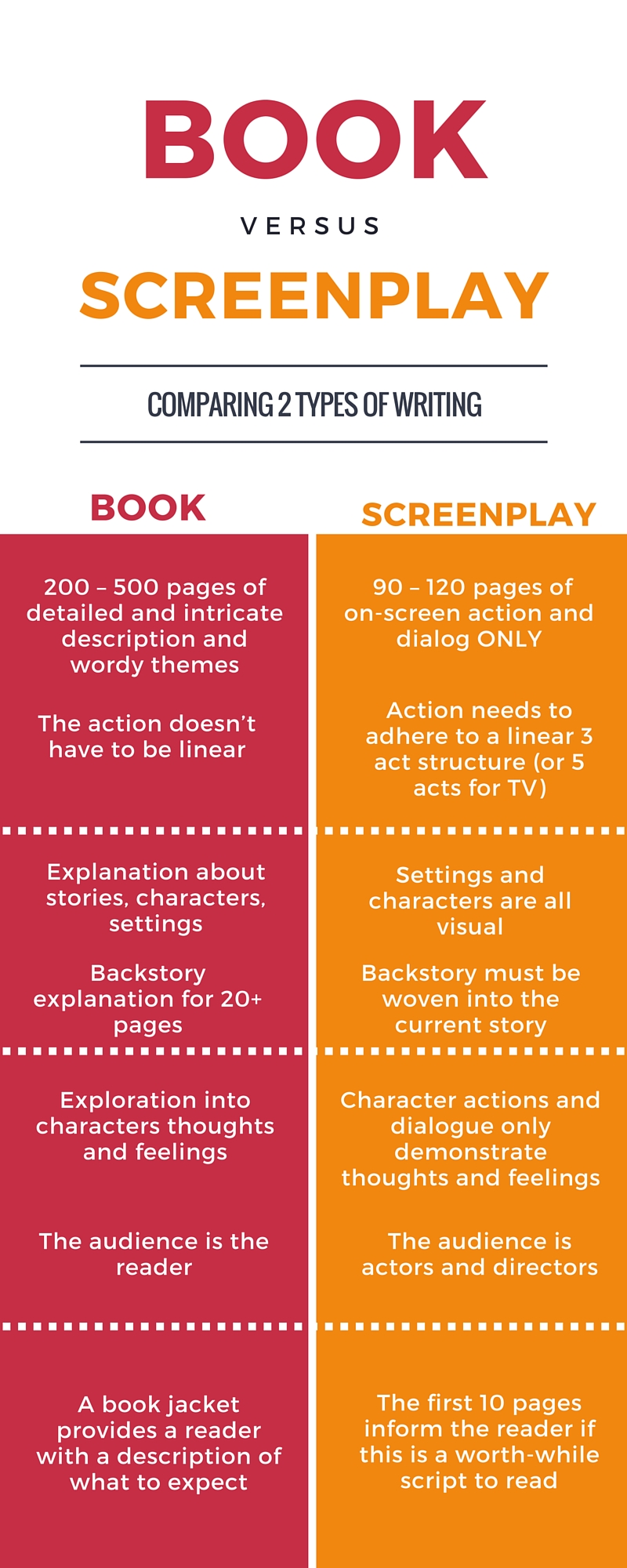
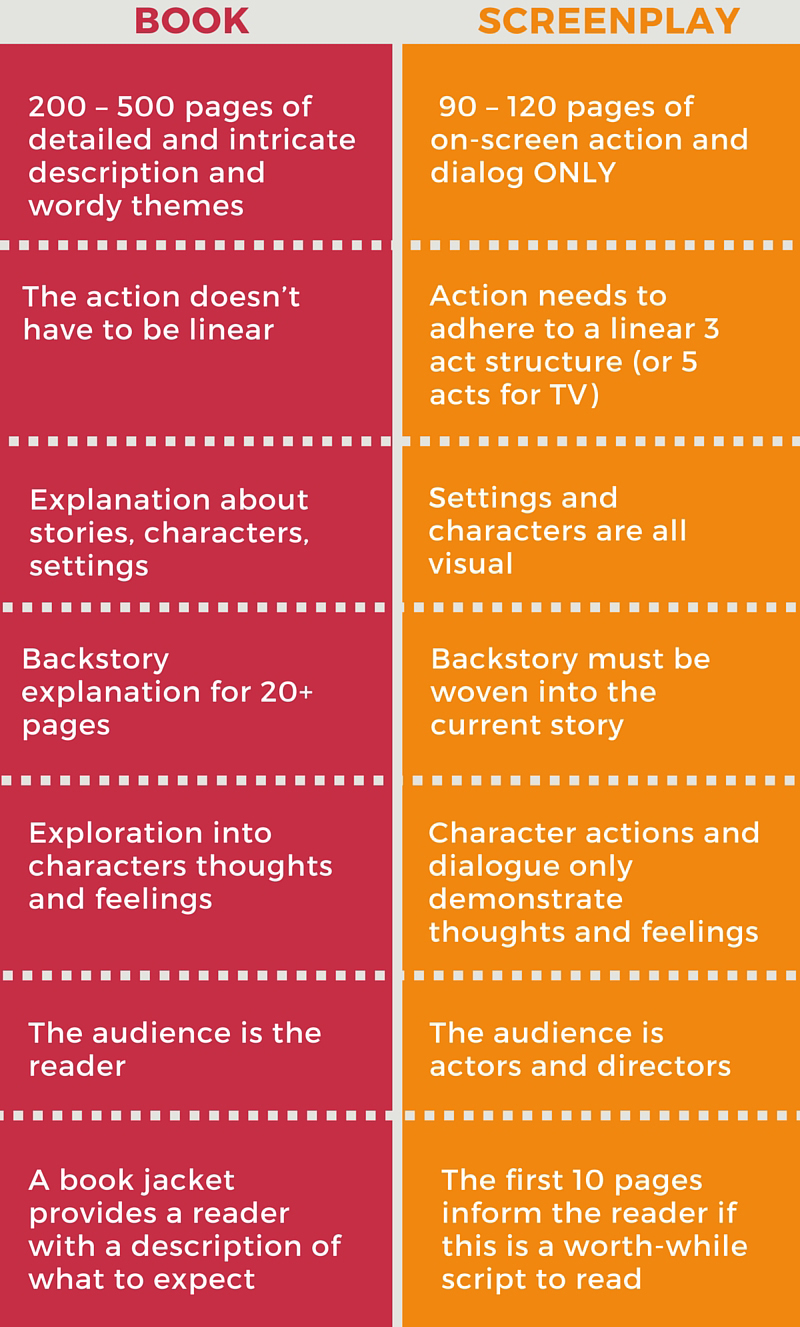
It takes most screenwriters 5-10 years to develop their craft to a professional and sellable level. Those are the people in Hollywood waiting tables and suffering for a decade writing dozens of scripts before they get their first shot.
So, while you might be a great author, it’s extremely unlikely that your first screenplay would end up as a home run right out of the gate.
And if it’s not a home run, not only will it not sell, showing it around town will tarnish your reputation and ruin your career over the long term.
But screen-craft isn’t the only issue…
As an author it’s next to impossible for you to do what’s necessary to take a giant “red pen” to your work, hack away, restructure and re-plot your story so it makes sense for film or TV.
During the adaptation process, about 75% of a book’s description is cut.
Additionally, 2 or 3 characters are often combined into 1 in order to cut down on unneeded plotting and focusing the story into a 1-2 hour hero’s journey.
So which character from your story would you choose to cut?
If that’s a difficult question for you to answer, you just proved my point : )
And that’s not your fault… you’ve spent a ton of time crafting your novel…
To objectively take a step back and pinpoint who/what/where should be cut in the name of driving the action forward is an impossible task.
So what do you do? Well, most successful authors don’t write their own screenplays.
Plus, what are you going to do with a screenplay once you have it anyway? Who would you send it to? Who do you know that will take your call?

It’s Not Enough To Have A Screenplay.
You Also Have To Get It In The Right Hands.
Most emerging authors, storytellers and screenwriters don’t yet have the relationships or the credibility to get their projects considered.
And most first time screenwriters don’t possess the craft yet to write at a professional level. Normally it takes years of practice.
As a screenwriter, it can be super frustrating to write draft after draft and still be told ‘it’s not there yet’ or ‘you still need to learn more about screenwriting’…
When all you really want to do is get your story into the market.
So if you’re an author, screenwriter or storyteller of any kind….
And your objective is to get your project into the film or TV market quickly and have it be considered for financing and production.
And not have it take the 5-7 years that it takes newcomers to…
Learn enough about the business to figure out which market your story is ideally suited…
Figure out the best most marketable way to tell the story on screen that will set it apart from the sea of other projects you’re competing with…
Learn the craft of screenwriting at a professional level…
AND spend a lot of time in Los Angeles to develop the relationships you’ll need to get the project into the right hands…
My team and I have decided to make it as easy as possible for you to have a highly professional, highly marketable film or television project…
That you are deeply involved in AND that you own…
PLUS… once it’s complete, we’ll use our relationships, track record and credibility to bring it to market, put it in the right hands, and endeavor to get the project financed and made.
At a fraction of the cost of how much it normally costs our high-level clients.

Introducing
::: Your Story-to-Screen Screenplay :::
The Done-For-You Method 9x More Likely To Sell Your Film/TV Project
For Authors Who Have A Book, Screenwriters With a 1st Draft, Or
Storytellers With Only A Story In Their Head

With a Story-to-Screen Screenplay, your project is going to rapidly rise to the status of a high-level professional project, and put into the market to attract producers, actors, directors and/or financing companies.
And you won’t have to spend a lifetime building your own relationships or do any of the uncomfortable ‘selling’ because we’re going to do that for you.
The workload of writing and selling falls on us!
But, to be clear, you’re not going to be left on the sidelines either… without having a voice in the process or influence over how it turns out…
Because, over the next few months, you’re going to collaborate with a seasoned producer & professional screenwriter…
Determining your story’s market direction… its creative direction… and the narrative of its unfolding screen adaptation…
As a screenplay that you own and control and that Voyage will present to possible buyers on your behalf (and help you negotiate a deal!)
Does This Really Work?
Here are just a few of the over 200 successful projects that started with a Story-to-Screen Screenplay
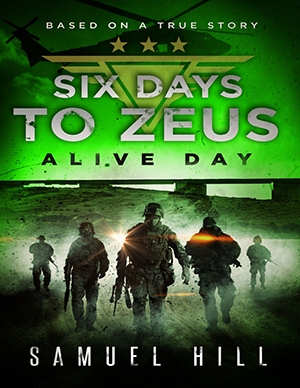 ALIVE DAY
ALIVE DAY
Special Ops Veteran and author Samuel Hill worked with Voyage and producer/screenwriter Kathleen McLaughlin to adapt his true story, Six Days To Zeus: Alive Day. Alive day is now a co production with Phoenix Pictures with Oscar-nominated Mike Medavoy (BLACK SWAN, THE THIN RED LINE) producing and with A-list director Phillip Noyce (SALT, THE GIVER) attached to direct.
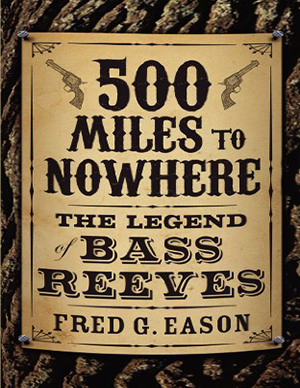 500 MILES TO NOWHERE
500 MILES TO NOWHERE
Voyage client and author Fred Eason decided to work with Voyage to adapt his historical novel 500 Miles To Nowhere. His film project is now set up as a co production between Voyage and Impossible Dream Entertainment, a company backed by its own film fund and helmed by Shaun Redick (GET OUT, BLACKKKLANSMAN)
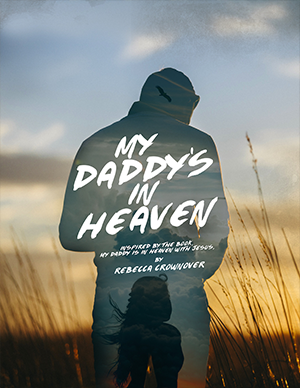 MY DADDY IS IN HEAVEN
MY DADDY IS IN HEAVEN
Children’s author and farmer from Texas, Rebecca Crownover, worked with Voyage to adapt her illustrated children’s book into a screenplay. Voyage then financed the movie through a combination of studio financing and private investment. The touching faith-based movie was released in March of 2018, hit #1 on Amazon, and is now streaming on Netfix.
What did these authors and storytellers have that you don’t?
The short answer is nothing.
They didn’t have bestsellers, big publishers, agents, a track record or anything.
But they were completely committed to doing what it takes to have a professional film or television project that can compete in the market.
And a desire to not waste time experimenting on their own.
So if you share their commitment…
Here’s how your Story-to-Screen Screenplay process works and what’s included:

Earlier we discussed that it costs a Hollywood producer between $85,000 and $110,000.00 to create a screenplay with a union-writer.
But you’re not going to pay even half of that…
If fact, you won’t even pay a quarter of it!
Our Story-to-Screen Screenplay normally costs a minimum of $15,000.00
But…
When You Click The Button Below And Order Your
Story-To-Screen Screenplay TODAY, Your Investment is Only…
$15,000.00 ONLY $9997.
(or 3 easy payments of $3500)
Or to register over the phone, call 310-392-4180 and press 1 for ‘new projects’
If lines are busy, keep trying.

Hurry… The Special Offer on your
Story-To-Screen Screenplay Ends Soon
You may be wondering why I’m doing this even when Voyage doesn’t profit at all on this process. Or you might think this means you'd be working with a lower level writer.
I’ve spoken with dozens of people in the last few months alone who simply could not afford the $15K it normally costs.
Many of whom have great stories that are worth developing and bringing to market.
Nothing crushes me more than when money gets in the way of a story having a shot in the market. Every time it happens, it’s like my heart gets ripped out of my chest.
I’ve also spoken with our team, producers and lots of screenwriters we work with. And we’re all in this together, nothing is scrimped on; and you’ll be working with the same group/same level of screenwriter as if you’ve paid the full fee.
This is a win for all of us.
You get to adapt your story for Hollywood at a fraction of the cost…
I get to bring one more fresh, new movie & TV show into the market…
And if I’m successful and we make a movie or show, Voyage makes money as do you!
So if you have a book, a screenplay, or even just a story in your head, let’s develop it into a professional level project, with an incredible screenplay, that Voyage will bring to market on your behalf.
Let’s make it happen!
-Nat
Or to register over the phone, call 310-392-4180 and press 1 for ‘new projects’
If lines are busy, keep trying.

Here’s What Others Are Saying

“The value of working with a producer in Hollywood who understands the business & who is willing to take the time to understand your story is invaluable. Up to this point, there is nothing that I have found like this…and I’ve been looking! Plus, I’m an author so writing my own screenplay felt daunting. Just like many other industries, there are gatekeepers to Hollywood, so when I saw what Voyage had to offer, I jumped at the chance to get involved because I know how difficult it is to get someone to look at your material, meet with you or work with you.”
Andrea Waltz, Author

“I’ve been writing since I was a little kid, and I have always wanted to see my work come to life. But I realized that I needed some professional help to get to that level. The opportunity to collaborate with a producer who is currently working in the industry to further develop my script and get it ready for the market was invaluable. At first, the cost was bit concerning for me but the value of what I got working with the team completely alleviated any hesitations I had in the beginning.”
Ron Modro, Screenwriter

“As a first time author, I had many reservations about my very first novel. What started out as "therapy writing" to assist my PTS Counselor, turned into a book. I had no idea that what I had written would strike so many people in the soul.
Samuel Hill, Author
I selected Kathleen McLaughlin from their list of producers. As promised, I was on the phone talking directly with her in very short order. Subsequent steps in the process led to collaborating with her on a screenplay. Voyage and Kathleen worked together to bring my manuscript up to par…
And then they got it in front of Phillip Noyce who immediately 'ATTACHED' to the project.
Of course, being from outside Hollywood, I heard the stories of how hard it was to "break in". I had no idea how the business worked and that left me feeling extremely vulnerable. Especially with a life story from the compartmented world of U.S. Intelligence.
I was so naive to the process that when I got the call that Phillip attached, I had no idea who Phillip was nor what attaching had to do with anything. Yeah, I’m from that planet.
I soon learned that ALL of my favorite movies, the ones that genuinely resonated with my soul, were done by Phillip Noyce. Films like PATRIOT GAMES, SALT, all in a genre that I lived and breathed in real life during my career as an Operations Intelligence Officer in the Tier One Warrior world.
Within a month or less, Phillip came to my hometown to visit with me, discuss the project and talk about where this project might go. Nat Mundel was there, every step of the way.
I was then invited to Hollywood, met with Mike Medavoy (BLACK SWAN, ALTERED CARBON), the Oscar-nominated producer that partnered with Voyage on my movie, and was invited to see what a premier was all about. It was then and there that I realized just how good these people were.
Had anyone told me in the past that some day my book would become a movie, I would have just ignored it, or maybe laughed at that person. But one chance meeting with Nat Mundel and his staff led me to open my "black heart of skepticism" and accept the reality that Voyage has the ability to do precisely what they say.
From product evaluation, to fruition. I still have to pinch myself and realize this is really going to happen
My sincere heart felt thanks to Voyage and Nat Mundel for the mentorship, the trust and the professional conduct that's bringing my book to the big screen!"

Frequently Asked Questions
In short, what is the Story-to-Screen Access Screenplay Program and what do I get?
Voyage will develop a commercially viable screenplay based on your book and a go-to-market packaging strategy for the project. In this program, you will work hand-in glove with a Voyage Producer, our project coordination team, and a professional non-union writer in a combination of phone calls, material reviews and notes as you collaborate through an approach, and outline/beatsheet and two drafts of your screenplay.
That answers my question, sign me up.
Who is the program for / Who is it NOT for?
The Story-to-Screen Screenplay program is for storytellers who have a book, a draft screenplay, or even just a story in their head, and are committed to seeing it unfold on the screen, and who want to give themselves an edge over other creators.
That answers my question, sign me up.
What happens after I sign up?
After you sign up, you’ll get a receipt and an email from one of our coordinators about how to select the producer you’ll be working with throughout the program.
We will then schedule your kick-off call with all parties involved.
That answers my question, sign me up.
How does Voyage bring my project into the market?
Like any producer does, Voyage uses its track record and relationships to reach out to 3rd parties (production companies, studios, financing companies, agents/managers, and/or actors/directors). This is a very personalized and relationship-driven process.
That answers my question, sign me up.
If a movie/TV deal materializes, how do I get paid?
If Voyage finds a potential buyer or deal, we then loop you into that negotiation, as we are not permitted to reach a deal without you.
While every deal is different and has unique terms, most storytellers will negotiate for fees (or what’s called a purchase price) for their rights, profit sharing percentages, a credit, and potentially consulting fees as well.
Voyage is incentivized as well, and will be included as a producer on the project and is paid by the financier out of the production budget (not as an agent who would take a % of your deal).
That answers my question, sign me up.
Or to register over the phone, call 310-392-4180 and press 1 for ‘new projects’
If lines are busy, keep trying.
